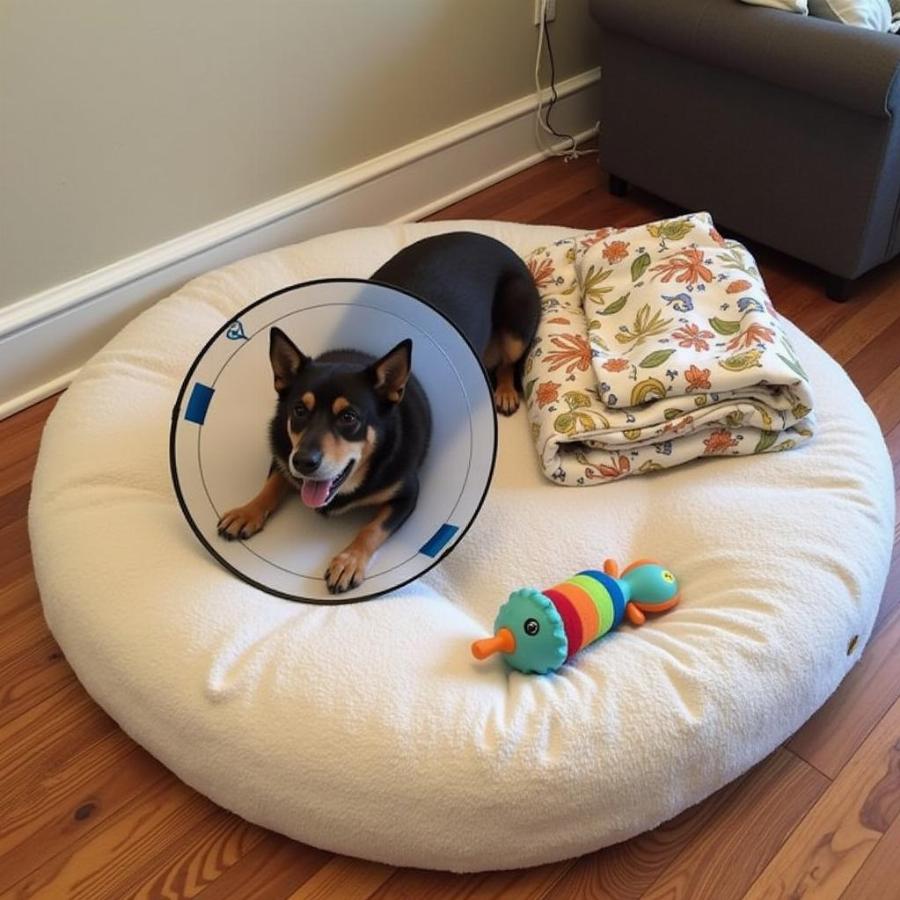A dog wearing a cone can be a comical, yet concerning sight. This essential tool prevents them from licking or biting wounds, sutures, or hot spots, but it also raises a natural question: can a dog sleep with a cone on? The short answer is yes, most dogs can and do sleep with a cone on. However, there are ways to make it more comfortable and ensure a good night’s sleep for your furry friend. Let’s explore the ins and outs of cone-wearing slumber and how to make the experience as stress-free as possible for both you and your pup.
Making Sleep Comfortable with a Cone
Getting used to a cone can be a challenge for any dog. Imagine trying to navigate your world with a lampshade around your head! It’s understandable that your dog might feel a bit awkward and disoriented at first. This can make sleeping especially difficult. However, with a little patience and a few adjustments, you can help your canine companion adjust and sleep comfortably.
Choosing the Right Cone
Not all cones are created equal. The traditional hard plastic Elizabethan collar can be cumbersome and noisy, bumping into walls and furniture, disrupting sleep. Consider softer, more flexible cones made of fabric or foam. These are often more comfortable for sleeping and allow for greater mobility.
Creating a Cozy Sleeping Space
Ensure your dog’s sleeping area is well-padded and spacious enough to accommodate the cone. A comfy dog bed or a pile of soft blankets can make a world of difference. If your dog is crate trained, you might need to upgrade to a larger crate temporarily to ensure enough room for movement.  Chuẩn bị chỗ ngủ cho chó đeo cone
Chuẩn bị chỗ ngủ cho chó đeo cone
Addressing Common Concerns About Dogs Sleeping with Cones
Understandably, owners have concerns about their dogs sleeping with a cone on. Let’s address some of the most common ones.
Will My Dog Suffocate?
As long as the cone is the correct size, allowing your dog to breathe and pant normally, there’s no risk of suffocation. Ensure they can reach their food and water bowls easily.
Can My Dog Get Stuck?
While unlikely, a dog could potentially get their cone stuck on furniture or other objects. Supervise your dog initially while they are wearing the cone and ensure their environment is free of hazards.
What if My Dog Can’t Sleep?
If your dog appears distressed or unable to settle down, try offering a favorite chew toy or providing extra comfort and reassurance. If the problem persists, consult your veterinarian. dog post surgery suit
Alternatives to Cones
In some cases, alternatives to the traditional cone might be more suitable for sleeping. soft cone for dog For example, inflatable collars or surgical recovery suits can provide similar protection while offering more comfort and freedom of movement. surgical suit dog
Inflatable Collars
These donut-shaped collars provide a cushion-like barrier and can be more comfortable for sleeping than traditional cones.
Recovery Suits
These snug-fitting garments cover the wound area and prevent licking and biting, offering a more comfortable alternative to a cone, especially for sleeping. dogs with injuries onesies for dogs after surgery
Conclusion
Yes, your dog can sleep with a cone on. With a little extra care and attention, you can ensure your furry friend gets the rest they need to heal properly. Choosing the right cone, creating a comfortable sleeping space, and addressing any potential hazards can help make the experience less stressful for both of you.
FAQ
- Is it cruel to make a dog sleep with a cone? No, it’s not cruel if the cone is fitted correctly and allows for normal breathing, eating, and drinking. It’s often necessary to prevent further injury.
- How long does a dog need to wear a cone? This depends on the injury and your veterinarian’s recommendations, typically ranging from a few days to several weeks.
- What if my dog keeps bumping into things with the cone? This is common initially. Supervise your dog and adjust their environment to minimize obstacles.
- Can I take the cone off at night? Only remove the cone if your veterinarian specifically advises it.
- What should I do if my dog refuses to eat or drink with the cone? Adjust the height of the bowls or try hand-feeding. If the problem persists, consult your veterinarian.
- Are there any alternatives to cones? Yes, inflatable collars and surgical recovery suits are potential alternatives.
- How can I make my dog more comfortable with a cone? Provide a comfortable bed, offer reassurance, and consider a softer cone material.